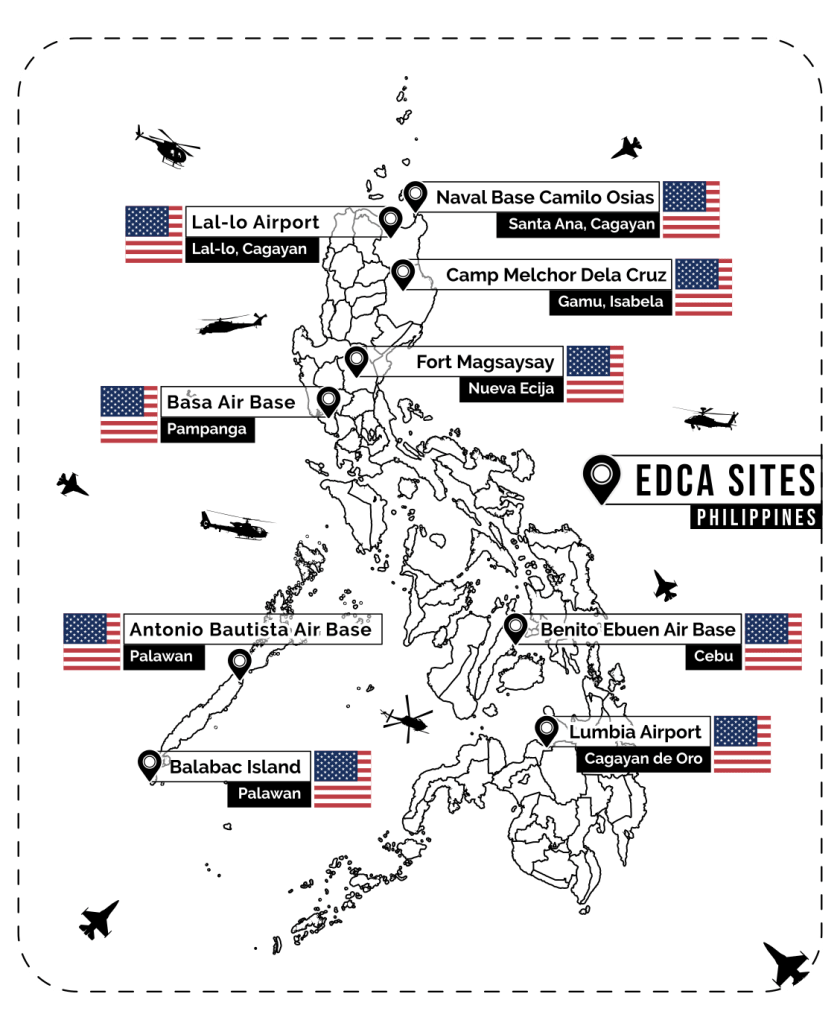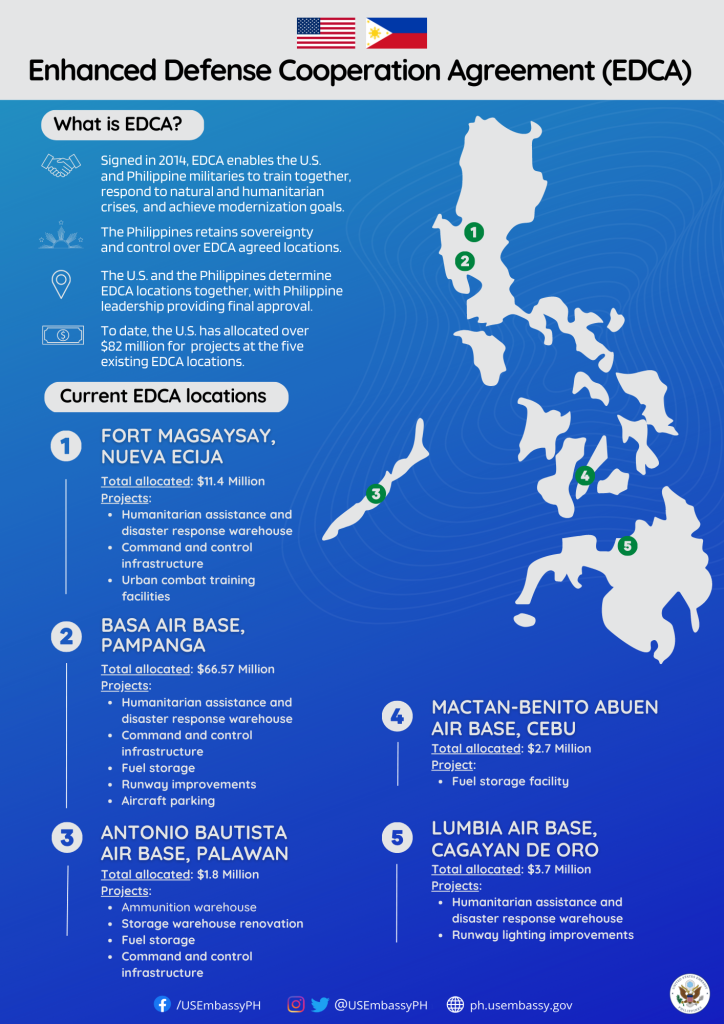While listening to an interview with David Petraeus on Iran International (run by Iranian opposition), I was struck by his mention of the “gated communities” concept for post-war Gaza (17:37). As the former commander of Multi-National Force – Iraq during the Iraq War, Petraeus oversaw various security strategies, including the implementation of walled-off neighborhoods designed to control movement and reduce violence. However, it appears that the U.S. military ultimately abandoned the idea, likely due to growing resistance from Iraqis, who viewed the barriers not as security measures but as a form of forced isolation.
Read More »Tag: safety

(Primer) A Decade of EDCA: US military bases and its expanding war games in the Philippines

The outright re-establishment of US military bases in the country and its relentless and escalating war games on land, sea, and air are flagrant manifestations of US imperialist domination of the Philippines. This further tightens the grip of US imperialism on the Philippine neocolonial state, especially on the puppet Armed Forces of the Philippines (AFP).
(Primer) A Decade of EDCA: US military bases and its expanding war games in the Philippines
US Army Soldier Dies from Injuries in Biden-Harris Gaza Pier Debacle
US Army Soldier Dies from Injuries in Biden-Harris Gaza Pier Debacle
This marks the third death related to the Gaza Pier mission. Just days before Sgt. Quandarius Davon Stanley’s passing, Norfolk’s Marine Hydraulics International (MHI) reported that two shipworkers died aboard the USNS 2nd Lt. John P. Bobo, a Military Sealift Command ship undergoing repairs in connection with the Gaza aid mission, was the site of a tragic accident during maintenance. The workers’ identities have not been released. The vessel had previously been dispatched to support the pier mission but was diverted to the shipyard after its engine room caught fire en route to Gaza in April.
V-22 Osprey: ‘Close Shave’ For U.S. Marines, Japanese Troops As Tiltrotor ‘Tilts’ Uncontrollably; Tokyo Grounds Entire Fleet
The Japan Ground Self-Defense Force (JGSDF) has grounded its fleet of Osprey tiltrotor aircraft after one of its V-22 Ospreys sustained damage during a failed takeoff attempt as part of the ongoing “Keen Sword 25” joint exercise with the United States.
Related:
Military officials: ‘Widowmaker’ Osprey will fly with a faulty clutch
The State of Army Watercraft | GAO Reports That Less Than 40% Are Mission Capable
The fight continues: U.S. states loosen child labor laws as violations keep soaring
Recent analysis shows that over the past 10 years child labor violations across the U.S. have tripled, reports the Washington Post. Investigators have uncovered an uptick in labor violations in standard work for teens, like fast food-restaurants and other service industries. Multiple instances of minors working in dangerous jobs that federal law prohibits, like meatpacking, manufacturing, and construction, have also been uncovered at increasing rates. Despite that, at least 16 states have one or more bills to weaken their child labor laws. What’s going on?
…
While most states have tougher laws than the federal rules, some Republican lawmakers seek to undo those restrictions in their state. These lawmakers are backed in their efforts by restaurant, liquor, and home builders’ associations, who stand to benefit from an expanded low-wage worker pool if the changes pass. Protection stripping legislation for six states was drafted or lobbied for by Florida-based lobbying group, the Foundation for Government Accountability, which fights to promote conservative interests like restricting access to anti-poverty programs. There are some states, like Colorado and Virginia, fighting the trend and enacting legislation to dial up penalties for violations. Rep. Sheila Lieder (D) introduced a bill in Colorado to raise the fines for violators saying that at $20 per offense, the current penalties were not high enough to effectively dissuade employers from violating child labor laws.
The fight continues: U.S. states loosen child labor laws as violations keep soaring
I thought that it was “woke” Democrats trying to destroy the family? /s
Related:
Read More »Milwaukee Shipped in 4,500 Cops From Across the US to Suppress Protest at RNC + More
Contestations over the Republican National Committee’s efforts to foreclose avenues for lawful protest outside this week’s Republican National Convention (RNC) were already heated months before GOP delegates started booking their flights to Milwaukee, Wisconsin, for the convention.
Milwaukee Shipped in 4,500 Cops From Across the US to Suppress Protest at RNC
Related:
Milwaukee officers will accompany all visiting police units after fatal shooting
Columbus police have killed more than 60 people since 2013
Columbus police shoot and kill more people than most of their peer cities, according to an analysis of police shootings data by the Columbus Dispatch, part of the USA TODAY Network.
Venezuela’s election in the crosshairs of new U.S. regime change scheme
Twenty-five years after Hugo Chávez took office and began the Bolivarian Revolution in Venezuela, US officials have still not tired of dreaming up new plots to overthrow the country’s government
Venezuela’s election in the crosshairs of new U.S. regime change scheme
When Do We Say Enough is Enough?: Philippines’ Tipping Point in Upholding Sovereign Integrity

When Do We Say Enough is Enough?: PH’s Tipping Point in Upholding Sovereign Integrity
Moreover, the involvement of Subic Bay, a location not officially listed as a site/base under the expanded Enhanced Defense Cooperation Agreement (EDCA) as the alleged destination of US military fuel from Pearl Harbor, prompts a critical inquiry about its role and whether it might be serving as an unofficial or de-facto EDCA site. Hence, it begs to inquire if Subic Bay is now effectively functioning as a de-facto EDCA site. And if so, could there be other undeclared de-facto EDCA sites serving similar purposes other than the nine declared ones?
…
Could it be posited that the current Philippine administration appears to prioritize the demands and interests of the United States over its own national interests, sovereignty, and independence, suggesting a level of deference that could be interpreted as reminiscent of a vassal state? This perspective raises questions about the autonomy of the Philippine political leadership and the extent to which it serves the interests of its citizens first and foremost. The lack of public discussion, accountability, and transparency on matters that potentially impinge on national sovereignty could be seen as indicative of a disproportionate influence by the U.S. on Philippine domestic affairs and foreign policy, prompting a reevaluation of the true nature of the bilateral relationship between the two nations.
Related:
Boots on the ground in the Middle East make Americans less safe, not more
Boots on the ground in the Middle East make Americans less safe, not more
This sound logic has been ignored in Iraq and Syria, where small numbers of American troops stationed on remote and exposed bases are under fire from Iranian-backed militias. As of this writing, at least 60 American service members have sustained injuries in more than 73 attacks over the past few weeks.
…
All of this brings to mind a solemn and recently observed milestone. On Oct. 23, the U.S. Embassy in Beirut marked the 40th anniversary of the U.S. Marine Corps barracks bombing, when a suicide bomber detonated a truck bomb killing 241 U.S. service members. Their mission was never clearly defined, they were bound by peacetime rules of engagement to maintain “neutral status,” and they took sniper and mortar fire from the moment their boots touched ground.
Daniel Davis said, in his interview with Jason Beardsley (author), that the attacks are up to 118. Beardsley is with Koch-funded Concerned Veterans for America.

You must be logged in to post a comment.